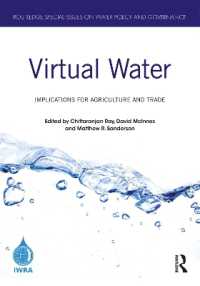- ホーム
- > 洋書
- > 英文書
- > Literary Criticism
Full Description
This open access book explores literary works and practices - always existing in the dynamic relation between locations and orientations - in a series of carefully designed case studies. Explicitly expressed or implied, manifesting itself sometimes as dislocation and disorientation, the claiming of space by any symbolic means necessary is revealed as a constant effect of literary endeavors. In dialogue with geopolitics of culture, sociology and anthropology, attention to literary locations and orientations brings spatial particularity into the study of world literatures.
These case studies demonstrate that four key terms (cosmopolitan, vernacular, location, orientation) can frame analyses of very different types of literary acts and texts in the contemporary period, allowing for distinctions that are not captured within the grids of other conceptual pairs like centre-periphery, local-global, postcolonial-metropolitan, North-South. With this framing, expressive practices in a wide range of regions - including Europe, Africa, the Middle East and the Pacific - are analysed in ways that bring out how spatiality is at stake in the cosmopolitan-vernacular dynamic.
The eBook editions of this book are available open access under a CC BY-NC-ND 3.0 licence on bloomsburycollections.com.
Contents
Notes on Contributors
Acknowledgements
Series Introduction - The Cosmopolitan-Vernacular Dynamic: Conjunctions of World Literature
Stefan Helgesson (Stockholm University, Sweden), Christina Kullberg (Uppsala University, Sweden), Paul Tenngart (Lund University, Sweden) and Helena Wulff (Stockholm University, Sweden)
Introduction - Land, Language, Literature: Cosmopolitan and Vernacular Claims to Place
Bo G. Ekelund (Stockholm University, Sweden)
1. One World Literature with Chinua Achebe and Flora Nwapa
Paula Uimonen (Stockholm University, Sweden)
2. The Locations and Orientations of South African Literature: From Sol Plaatje to Peter Abrahams
Ashleigh Harris (Uppsala University, Sweden)
3. Dislocation in Ahmad Saadawi's Frankenstein in Baghdad and Hassan Blasim's The Madman of Freedom Square
Tasnim Qutait (Uppsala University, Sweden)
4. Locating the Literature of Hawai'i
Sally Anderson Boström (Uppsala University, Sweden)
5. Sites of Solidarity and Circuits of Second World Reading: Ralph de Boissière's Crown Jewel and the Locations of the Proletarian Novel
Bo G. Ekelund (Stockholm University, Sweden)
6. Core: Ecologies of Muslim-American Writing
Adnan Mahmutovic (Stockholm University, Sweden)
7. Locations, Orientations and Multiple Temporalities in the Contemporary, 'Global' Latin American Novel
Jobst Welge (Leipzig University, Germany)
8. Ambiguous Arrival: Emotions and Dislocations in the Migrant Encounter with Sweden
Helena Wulff (Stockholm University, Sweden)
Afterword - At Home in the World
Deborah Reed-Danahay (University at Buffalo, SUNY, USA)
Index








